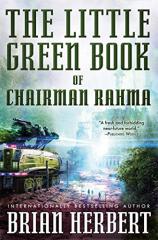The Little Green Book of Chairman Rahma
Review
The Little Green Book of Chairman Rahma
The “greening” of big government has long been a contentious issue in the so-called developed world, and no more so than in our current era. Recent years have witnessed a steady increase in the environmental vote, to the point of winning or losing crucial elections for politicians who, a generation ago, never would have given a second thought to the state of our air, water, soil, flora or fauna.
Mindful awareness of our planet’s finite resources is a good thing. But what happens when conflicting environmental agendas run amok on a global scale? Can being too “green” actually lead to societal and planetary catastrophe? Brian Herbert boldly tests out the idea in his latest speculative novel, THE LITTLE GREEN BOOK OF CHAIRMAN RAHMA.
The title itself is a revealing indication of where Herbert’s imaginative scenario is headed. Yes, the “little green book” exerts the same ubiquitous influence on society as the famous “little red book” of the historical (and still revered) Chairman Mao. A similar idealism permeates an anti-corporate, anti-consumerist revolution that quickly lost its proactive innocence and turned totalitarian, pitting a futurist Green States of America (stretching from the North Pole to Terra del Fuego) against Euro-African and pan-Asian unions.
"While focusing on characters (both human and humanoid) and events within the outrageously arrogant GSA, Herbert illustrates quite convincingly that humanity itself must undergo a radical transformation and renewal."
It’s 2061, where fewer and more dangerous power-mongers now run the world. The lives of billions under their control are severely restricted, no more so than in the GSA, where you can be “recycled” (made dead!) for trivial crimes such as throwing away something that can be re-used or composted, having too many material possessions, venturing off the human settlement “reserves” or speaking critically about any aspect of government.
Into this Orwellian world, where utopian ideals are ironically enforced with uncompromising severity, Herbert deposits a group of characters whose interactions and exploits reveal just how deficient one-size-fits-all solutions can be when applied in the traditional top-down manner of big government.
The GSA under its totalitarian leader, an iron-willed hippie called Chairman Rahma, controls a super-technology that allows vast formerly industrialized areas to be dissolved into their molecular components by a kind of death-ray and then “green-formed” immediately back to their prehistoric verdure. It reads like something out of “Star Trek,” minus any attempt at scientific gobbledygook to explain how; it just is. And that’s enough for Herbert’s premise in THE LITTLE GREEN BOOK OF CHAIRMAN RAHMA, since it’s pretty clear from the beginning that he’s using the ridiculous to get to the sublime.
Without giving away the multi-layered but well-engineered plot --- based on the usual human cravings for sex, power, wealth and even immortality --- it’s safe to say that none of the competing global government systems get it right. In fact, they manage to efficiently and mutually destroy themselves and leave a clean slate as their legacy.
While focusing on characters (both human and humanoid) and events within the outrageously arrogant GSA, Herbert illustrates quite convincingly that humanity itself must undergo a radical transformation and renewal.
In order to even begin to understand our true relationship with the planet that gives us and all species life, our eventual reawakening will have to involve more than mind-melding with trees. But strange as the concluding process is for Herbert’s persistently idealistic survivors, the point is both graphically and greenly made.
Reviewed by Pauline Finch on August 22, 2014
The Little Green Book of Chairman Rahma
- Publication Date: March 29, 2016
- Genres: Fiction, Science Fiction
- Paperback: 416 pages
- Publisher: Tor Books
- ISBN-10: 0765381508
- ISBN-13: 9780765381507





